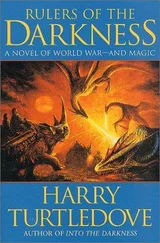Mithqal took out a six-sided crystal. “The iris stone,” he said, and held it up. Rainbows appeared on all the walls of the office. “Thus you note its chiefest property.” He might have been delivering a lecture. “Should the rainbows be agitated, that will show the influence of some other magic.”
He carried the iris stone all around the desk. The rainbows shifted and swirled, but he accepted that, so Hajjaj supposed he was seeking some larger derangement. And, sure enough, Mithqal put down the crystal with every sign of satisfaction. He blew out the candle, carried it into Hajjaj’s chambers, and lighted it again, repeating the ritual he had used in the outer office.
Once more, the rainbows swirled on the walls as Mithqal carried the iris stone around the candle. Once more, that was the only thing that happened. The mage nodded to Hajjaj, “Your Excellency, as best I can tell, no one is spying on you from without.”
“I am glad to hear it,” Hajjaj said.
“I could have told you as much, your Excellency,” Shaddad said. Hajjaj glanced at him. He coughed a couple of times. “Er—not with such certainty, perhaps.”
“Indeed,” Mithqal said, and mercifully let it go at that. “Now to see if anyone has been listening from within.” He drew a couple of withered objects from his pouch, one small and looking rather like a bean, the other resembling a thick, curled brown leaf, but hairy on one side. “I have the heart of a weasel, with which to seek out treachery, and also the ear of an ass, to signify treachery in respect to hearing.” As an aside, he remarked, “Perhaps I might have done without the latter.” Shaddad suffered another coughing fit.
Holding the heart in one hand and the ass’ ear in the other, Mithqal began to chant. The ear started writhing and twitching, as it would have done were it attached to a living animal. Shaddad jumped; he might never have seen magecraft before. Hajjaj watched in the fascination he gave any workman manifestly good at his craft. “Something?” he asked in a low voice, so as not to disturb the mage.
“Something, aye,” Mithqal breathed. He stalked out to the outer office, in the direction toward which the ear pointed. Hajjaj followed. So did Shaddad, his eyes round and white and staring in his dark face. Guided by the ass’ ear, Mithqal moved toward the secretary’s desk.
Shaddad cried out in despair and fled.
Mithqal threw down his sorcerous implements and pursued. He was younger and lighter on his feet than Hajjaj’s secretary. After a moment, Hajjaj heard more shouts, and then a thud. He sank to a cushion and buried his face in his hands. He had trusted Shaddad, and here was his trust repaid with treason. But anguish was only half of what he felt. The other half was fear. How long had Shaddad been suborned, and how much had he passed to Unkerlant?
The secretary cried out once more, this time in pain. Hajjaj winced. Those questions would have answers, and soon. Shaddad would not like giving them. That no longer mattered. He would give them whether he liked to or not.
“What one mage can do, another can undo.” Pekka quoted the adage loud. She preferred talking to herself to listening to the icy winds from the south howling around her Kajaani City College office. The only trouble was, she was lying to herself. Her laugh came bitter. “What one mage can do, even the same mage can’t undo—or figure out how she did it in the first place.”
Her only consolation was that she wasn’t the only baffled theoretical sorcerer in Kuusamo. Raahe and Alkio hadn’t been able to discover where the missing acorn from the pair in her experiment had gone. Neither had Piilis. Neither had Master Siuntio, and neither had Ilmarinen, so far as she knew, though he was worse than any of her other colleagues at telling everyone what he was up to.
Pekka looked at her latest stab at an explanation. It wasn’t going anywhere. She could feel it wouldn’t go anywhere, and had to fight back the strong impulse to crumple up the sheet of paper and throw it away. She’d tried explanations based on the assumption that the laws of similarity and contagion had a direct relationship. They’d failed. She’d also tried explanations based on the assumption that the laws of similarity and contagion had no direct relationship. They’d failed, too.
That left… “Nothing,” Pekka said. “Nothing, curse it, nothing, nothing, nothing.”
Again, she resisted the urge to tear up her latest set of calculations. She wished she’d never got involved in theoretical sorcery in the first place. Her husband, a practical man if ever there was one, kept making progress in useful applications of magecraft that strengthened Kuusamo and delighted the Seven Princes.
“I didn’t want to be practical,” Pekka muttered. “I wanted to get down to the bottom of things and understand them, so that other people could be practical with them. And what happened? I’ve gotten down to the bottom of things, I don’t understand them, and other people are doing just fine being practical without them.”
Temptation, twice resisted, came back stronger than ever and won. She made a very small ball of her latest set of calculations and threw the ball toward the wastepaper basket. She missed. Shrugging, she got up and went over to retrieve the wadded-up sheets. She’d missed with the calculations. She supposed it made sense that she should miss in getting rid of them, too.
She’d just dropped the ball of paper into the wire basket—it had plenty of company there—when someone knocked on the door. She frowned. It was early for Leino to have finished his latest round of experiments. Of course he works late, Pekka thought. His work is actually getting somewhere. And that had to be the most peculiar knock she’d ever heard. It sounded more as if someone had kicked the door, but much too high up to make that likely, either.
Frowning still, she pulled the door open—and jumped back in alarm. Of all the things she’d expected to see in the hallway, a man standing on his head was the last. “Powers above!” she burst out, all the while thinking, Well, that explains how he knocked on the door.
“And a fine good day to you, Mistress Pekka,” the man said with a grin his being upside down tried to transmogrify into a frown.
Only then did Pekka realize she knew him. “Master Ilmarinen!” she exclaimed. “What are you doing there?”
“Waiting for you to open the door,” the elderly theoretical sorcerer replied. “Wondering if I was going to fall over before you did open the door.” With a spryness that gave that the lie, he went from upside down to right side up. His face, which had been quite red, resumed its natural color.
“Master Ilmarinen…” Pekka repeated his name with such patience as she could muster. “Let me ask a different question, Master: why were you standing on your head while you waited for me to open the door?”
“You are a true theoretical sorcerer, Mistress Pekka,” Ilmarinen said, bowing. “No sooner do you observe an unexplained phenomenon than you seek the root cause behind it. Most commendable indeed.”
That kind of mocking praise infuriated Pekka as nothing else could have done. “Master,” she said tightly, “shall we see if the constabulary reckons your untimely demise an unexplained phenomenon? If you don’t start talking sense, we can experimentally test the notion very soon.”
Ilmarinen laughed, breathing spirit fumes into her face. She glared at him, really tempted to perform that experiment. Powers above, had he got drunk, hopped aboard a ley-line caravan coach, and traveled down to Kajaani in the middle of a Kuusaman winter for no better reason than to drive her mad? For anyone but Ilmarinen, the notion would have been absurd. Even for him, it should have been. The large rational part of her mind still insisted it was. But her large rational part also recognized that Ilmarinen’s rational part wasn’t anywhere near so large.
Читать дальше












